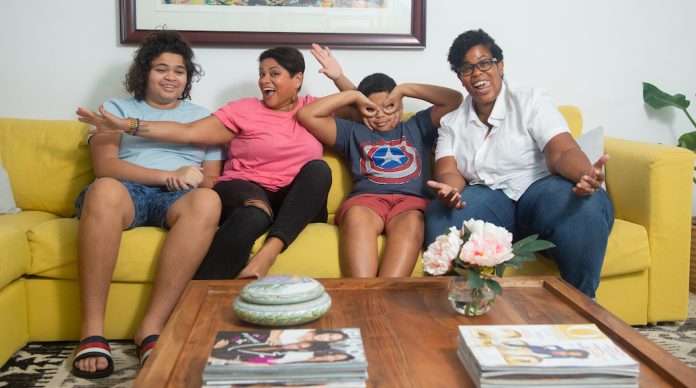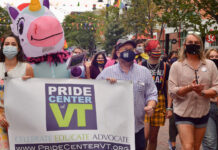[This article appears in the July/August 2019 issue of Boston Spirit magazine. Subscribe for free today.]
“Maybe we should just live here.”
These were Veronica Cintron’s words every time she and her wife Ronia Peguero visited Puerto Rico. A native Puerto Rican transplanted to New England, where the couple created a family and built a successful business, Cintron had taken her family to vacation in the land of her birth every year.
Originally just an expression of love for her home country, the annual statement began to take on added weight in recent years. Then came Hurricane Maria. “To see my home distressed broke my heart,” she says, “I felt so powerless.”
In an extraordinary move, the couple made the decision to pack up their belongings and their children and move from their home in Providence, Rhode Island, starting a new in their life just outside San Juan.
Heeding the cry
The fact that the US government abandoned Puerto Rico in the wake of Hurricane Maria tears at their hearts. With hundreds upon hundreds of fatalities, Puerto Rico suffered catastrophic damage and a major humanitarian crisis, including the destruction of its electrical grid, already damaged by Hurricane Irma two weeks prior. For weeks in Maria’s wake, most of the island’s population experienced flooding and lack of resources. Total losses from the hurricane are estimated at close to $70 million, ranking it as the third-costliest tropical cyclone on record.
The almost nonexistent government relief process compounded the agony of Maria’s destructive wallop to the island. The White House made few preparations in the lead-up to the storm, and it was weeks before the Federal Emergency Management Agency committed its resources to the island. During that time, clean water was scarce, food was hard to find, and hospitals struggled to care for patients, some of whom had life-threatening injuries and illnesses. Most of Puerto Rico lacked electricity for months, medical supplies were few and far between, and FEMA botched their own food distribution plan.
According to Cintron, the Puerto Rican people came to the realization that, if they were going to recover, they were going to have to do it themselves. They came together as a people, with neighbors helping neighbors, doing what needed to be done. This, Cintron says, has resulted in a groundswell of island pride.
“We went down to see it for ourselves,” she says, “and decided right then to move.” As difficult as was to uproot their family from the home they had made in New England, “it was very emotional and inspiring to see how close the community had become.”
This is a tremendous source of pride for Cintron, with Peguero’s feelings about the move matching those of her wife. Both women are committed to building awareness, to lifting the voice of the Puerto Rican people, and women in particular. “I like the idea of creating change,” Peguero says, highlighting the empowerment of women as important work for them both.
Cintron raises her loosely clenched fist in the air, saying, “We’re coming! We are ready to talk about how amazing the Puerto Rican people are. We are ready to bring our work and our energy to a new audience.”
Adds Peguero with a smile, “A lot is going to happen in Puerto Rico.”
Expanding business horizons
The Puerto Rican business climate was another very significant reason behind this move. The couple are business partners in addition to life partners, owning a successful branding and marketing company called V+R Digital. While maintaining the client base they’ve built from New England, they anticipate expanding into a new market while helping rebuild an economy in aftermath of devastation.
They also love the prospect of being immersed in a pro-woman business climate.
“In Puerto Rico, women dominate in business,” says Cintron. “It is so different from the States. Women are respected in the business world there.”
The island territory has undergone some significant changes of late, she explained, many of them being connected to the hurricane, but also to the troubling debt that has dogged the government. In an all-out effort to entice investors, Puerto Rico instituted attractive new tax laws, including enacting new legislation aimed at attracting new investors as well as encouraging successful Puerto Ricans who have left the island to return.
Because of Puerto Rico’s territory status, Americans don’t have to renounce their citizenship or pay an exit tax when they move to Puerto Rico. While the US taxes its citizens on their world-wide income, Section 933 of the US Tax Code exempts income sourced from Puerto Rico from federal tax. Thus, by moving to Puerto Rico, investors and money managers can drastically cut their US tax bills.
These benefits are appealing to the young couple, who have taken an interest in cryptocurrency and in building generational wealth. They are excited to establish themselves as a niche agency, able to service their existing customers in the northeast as well as new clients in Puerto Rico and the surrounding islands.
How have V+R Digital Branding’s clients handling the transition? Surprisingly well, both women assert. “Our clients know that our goal is to get them to a place where they are sufficiently wealthy,” says Cintron, “and that has not changed. If anything, our new lifestyle has enhanced our ability to pass on our new commitment to quality of life.”
“Our clients are more excited than ever to work with us,” echoes Peguero. The couple credits their new perspective with a phenomenal growth in their business, having tripled it in the last year. “People are seeking us out,” says Cintron, “so we can be even more protective of our time. We are much less interested in making big presentations or engaging in pointless phone conversations. Today, discussions happen more organically, making the whole process feel different.”
As for their passion to work with the people of Puerto Rico, the two have found their niche in working with the government. “We are here whole-heartedly because of the people,” says Peguero, “and we wanted to find the way to have the greatest impact.” It turns out that there is a great deal of government money available, but that the island people are often unaware of its existence. With their broader perspective, Peguero and Cintron are able to leverage their time and expertise into efforts at educating the community, inspiring others to take advantage of the broad range of assistance. They are building workshops, offering their expertise on a consulting basis, and often engage in barter arrangements.
Quality of life
The business climate is hardly the only reason for this move, however.
For one thing, there is the well-entrenched American attitude toward people of color. “Frankly,” says Cintron, “I’m tired of being a minority. It’s exhausting.” Both women look forward to living in a place where they are not outnumbered, at least in terms of ethnicity. “It may be challenging,” she continues, “getting established as gay women, but challenge is not new to us, and we’re ready.”
Peguero was born in Rhode Island, her parents having emigrated to the US from the Dominican Republic, so she also has close ties with an island nation, this one situated adjacent to Puerto Rico in the Caribbean Sea. A powerhouse of knowledge in her own right, exuding positive energy and confidence, she is a perfect complement to Cintron’s benign, spiritual persona. Still, she took some convincing to fall in love with the idea of this move.
Of Rhode Island, she says, “I have lived here all my life. We got married in the back yard of our beautiful house. It is a lot to leave behind.” In the end, it was the quality of life that convinced her. “I have always felt challenged between being American and my Dominican heritage,” she says. “In truth, I have really never felt American. And I like what’s happening in Puerto Rico.” In comparison to the Dominican Republic, Puerto Rico stands out too, having less of what she describes as ‘machista,’ a drawback to the land of her parents’ birth. “Puerto Rico has more structure, more rules maybe, but it’s actually a freer lifestyle than in the DR.”
She also envisions a positive impact for their two children, ages ten and thirteen. While they were not sure about all the details—like school, for example—they loved the chance to expose the boys to a very different lifestyle, one that feels more enriching and wholesome to the couple.
“The whole thing feels refreshing,” Peguero says. “I like working on my own terms. I don’t like feeling like I’m on a hamster wheel. I like spending time with my family. And all of that fits right in with life in Puerto Rico.”
Relajarse (Relax)
The family left Providence as soon as school let out for summer vacation, selling their house and finding temporary accommodations just outside the city of San Juan. Their decision not to buy a home was partly a desire not to limit themselves to a location, but also to the home-buying process, which in Puerto Rico can be extremely time-consuming.
Truth is, everything can seem very slow to folks coming from the states. “Life moves slowly here,” says Cintron, laughing. “It has taken some getting used to.” The water was not working in their rental home when they arrived, and it was a trial-by-fire introduction to the slow pace of things on the island. It got fixed eventually, and the couple has learned to respect the Puerto Rican pace of life, adopting the attitude of ‘relajarse.’ “Here, people want to do business face-to-face, not via email or text or even phone,” says Cintron. “They want to meet you over lunch, which might take hours. And you have to be nice. You have to be decent—there is no distinction between the business persona and the basic human identity.”
It has also been an exercise in learning to adapt to a different measure of success. “As much as we wanted to get off the hamster wheel,” said Peguero, “It took a while to acclimate.” There is less focus on success being measured in how full your calendar is. “Here, luxury is measured in time,” says Cintron. “It is much more about quality of life.”
Initially, the biggest issues the couple faced centered on the children, who arrived speaking no Spanish and were despondent to be away from their familiar world, especially their grandparents. The decision was made to home-school them, using an online program, so that they could be free to travel back and forth between Puerto Rico and Providence. Arrangements were made for Cintron’s father to visit periodically also, giving her a chance to show him a Puerto Rico he did not know. Overall, the couple feels good about exposing their kids to the best of both worlds—to which they have responded beautifully—and the pace of island life affords them more opportunity to spend time together as a family, which makes everyone very happy.
A global perspective
Peguero and Cintron are enthusiastic about the way their lives have unfolded to date. “Everything is happening as it should,” says Cintron. “You can’t force it, especially here.” “I can honestly say,” echoes Peguero, “that we have no regrets. I feel like we live in a resort.” Interestingly however, the couple took their first trip to Europe last fall, and fell in love with Paris. As happy as they are in Puerto Rico, they envision a future where they spend part of their time in France as well.
“We love Providence,” says Peguero. “We love Puerto Rico. And perhaps we will one day have multiple properties around the world. We are developing a global perspective. It doesn’t have to stop here.”
Not a subscriber? Sign up today for a free subscription to Boston Spirit magazine, New England’s premier LGBT magazine. We will send you a copy of Boston Spirit 6 times per year and we never sell/rent our subscriber information. Click HERE to sign up!









